World Environment Day is the largest platform for environmental outreach. Established by the UN in 1973, it puts a spotlight on the serious environmental challenges of our time and engages people across the globe in efforts to protect and restore our Earth.
 More than 150 countries participate in this international day, which features a different environmental focus each year – air pollution, biodiversity loss, food security, illegal wildlife trade. This year’s theme focuses on plastic pollution. More than 400 million tons of plastic is produced every year, with approximately 20 million tons ending up in lakes, rivers and oceans.
More than 150 countries participate in this international day, which features a different environmental focus each year – air pollution, biodiversity loss, food security, illegal wildlife trade. This year’s theme focuses on plastic pollution. More than 400 million tons of plastic is produced every year, with approximately 20 million tons ending up in lakes, rivers and oceans.
Most plastics are produced from oil and gas, both of which are fossil fuels. The more plastic produced, the more fossil fuel is required and the more we intensify the climate crisis. Microplastics, tiny particles up to 5mm. in diameter, find their way into food, water and air and are a source of concern for the viability of life on all levels.
Let us do what we can to minimize our use of plastics for the sake of our environment and for the sake of our health and safety of all Earth’s creatures.
For more information on this year’s theme of plastic pollution, check out the following: https://www.worldenvironmentday.global/
El Día Mundial del Medio Ambiente es la mayor plataforma de divulgación medioambiental. Establecido por la ONU en 1973, pone de relieve los graves problemas medioambientales de nuestro tiempo y compromete a personas de todo el mundo en los esfuerzos por proteger y restaurar la Tierra.
Más de 150 países participan en este día internacional, que cada año se centra en un tema medioambiental diferente: contaminación atmosférica, pérdida de biodiversidad, seguridad alimentaria, comercio ilegal de especies silvestres. El tema de este año se centra en la contaminación por plásticos. Cada año se producen más de 400 millones de toneladas de plástico, de las cuales unos 20 millones acaban en lagos, ríos y océanos.
La mayoría de los plásticos se producen a partir de petróleo y gas, ambos combustibles fósiles. Cuanto más plástico se produce, más combustible fósil se necesita y más intensificamos la crisis climática. Los microplásticos, partículas diminutas de hasta 5 mm. de diámetro, llegan a los alimentos, el agua y el aire y son una fuente de preocupación para la viabilidad de la vida a todos los niveles.
Hagamos lo que podamos para minimizar nuestro uso de plásticos por el bien de nuestro medio ambiente y por el bien de nuestra salud y la seguridad de todas las criaturas de la Tierra.
Para más información sobre el tema de este año, la contaminación por plásticos, consulte: https://www.worldenvironmentday.global/


 What must have been their thoughts as they looked upon the forbidding landscape with its towering rocky c liffs and craggy head lands ? Although they had seen poverty in Ireland, t he abject poverty of this place with its rude shacks and derelict fishing stages perched on the side of the hills, would have seared their hearts and minds. Sister Francis had lived in the colony for six years, but for Sisters Ursula and Rose the scene before them must have caused some dismay and distress.
What must have been their thoughts as they looked upon the forbidding landscape with its towering rocky c liffs and craggy head lands ? Although they had seen poverty in Ireland, t he abject poverty of this place with its rude shacks and derelict fishing stages perched on the side of the hills, would have seared their hearts and minds. Sister Francis had lived in the colony for six years, but for Sisters Ursula and Rose the scene before them must have caused some dismay and distress.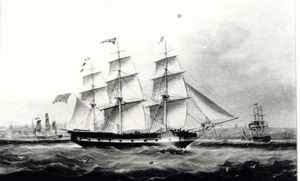 ¿Qué debieron de pensar al contemplar el imponente paisaje de acantilados rocosos y escarpados promontorios? Aunque habían visto la pobreza en Irlanda, la abyecta pobreza de este lugar, con sus rudimentarias chozas y sus abandonadas etapas de pesca encaramadas en las laderas de las colinas, les habría abrasado el corazón y la mente. La hermana Francis había vivido en la colonia
¿Qué debieron de pensar al contemplar el imponente paisaje de acantilados rocosos y escarpados promontorios? Aunque habían visto la pobreza en Irlanda, la abyecta pobreza de este lugar, con sus rudimentarias chozas y sus abandonadas etapas de pesca encaramadas en las laderas de las colinas, les habría abrasado el corazón y la mente. La hermana Francis había vivido en la colonia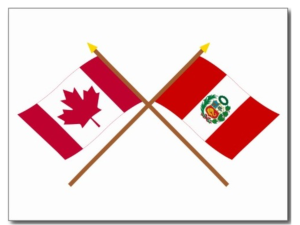 Sisters of Mercy from Newfoundland and Peru now minister in two areas of the country – in Puerto Eten, Reque and Eten, in the Chiclayo region and in Huarmey, Casma, Ancash. Eight sisters of the Congregation of the Sisters of Mercy of Newfoundland (including four native Peruvians) work with the people, especially poor people, in towns and small villages in these two regions of Peru.
Sisters of Mercy from Newfoundland and Peru now minister in two areas of the country – in Puerto Eten, Reque and Eten, in the Chiclayo region and in Huarmey, Casma, Ancash. Eight sisters of the Congregation of the Sisters of Mercy of Newfoundland (including four native Peruvians) work with the people, especially poor people, in towns and small villages in these two regions of Peru.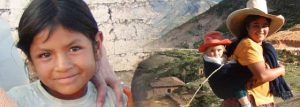
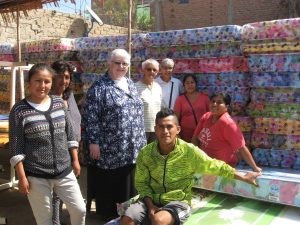 Educational programs and materials, e.g. reading materials, computers, student supplies are made available when resources allow. Emphasis is placed on working with women in areas of family care, health, nutrition, sewing, gardening, etc. Opportunities are provided for men and women to develop skills in carpentry and farming of family gardens – a cooperative venture to help people help themselves. Medical needs in the form of prescription drugs, diagnostic tests, x-rays, and special procedures or treatments are also provided through the fund.
Educational programs and materials, e.g. reading materials, computers, student supplies are made available when resources allow. Emphasis is placed on working with women in areas of family care, health, nutrition, sewing, gardening, etc. Opportunities are provided for men and women to develop skills in carpentry and farming of family gardens – a cooperative venture to help people help themselves. Medical needs in the form of prescription drugs, diagnostic tests, x-rays, and special procedures or treatments are also provided through the fund.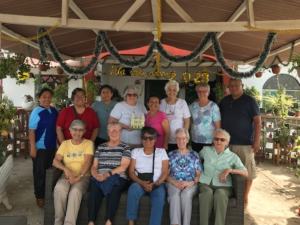 Our Sisters of Mercy now minister in two areas of the country – in Puerto Eten, Reque and Eten, in the Chiclayo region and in Huarmey, Ancash. Six sisters of the Congregation of the Sisters of Mercy of Newfoundland (including four native Peruvians) work with the people, especially those made poor, in towns and small villages in these two regions of Peru.
Our Sisters of Mercy now minister in two areas of the country – in Puerto Eten, Reque and Eten, in the Chiclayo region and in Huarmey, Ancash. Six sisters of the Congregation of the Sisters of Mercy of Newfoundland (including four native Peruvians) work with the people, especially those made poor, in towns and small villages in these two regions of Peru.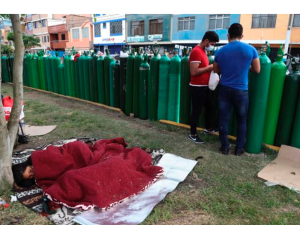 time. Peru was affected enormously by the onslaught of Covid and its health system collapsed totally. Together with our co-workers, the Conference of Religious of Lima, and The Conference of Religious of Chimbote, plans were made to look for and purchase an Oxygen Plant for the city of Chimbote.
time. Peru was affected enormously by the onslaught of Covid and its health system collapsed totally. Together with our co-workers, the Conference of Religious of Lima, and The Conference of Religious of Chimbote, plans were made to look for and purchase an Oxygen Plant for the city of Chimbote.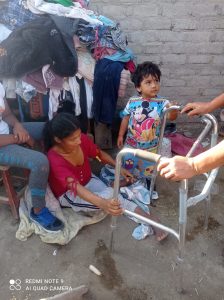 In the Diocese of Chiclayo the Sisters had much support from Caritas organization, along with many individuals and NGOs, especially for their outdoor neighborhood kitchens . These kitchens are the main way people receive a hot meal each day.
In the Diocese of Chiclayo the Sisters had much support from Caritas organization, along with many individuals and NGOs, especially for their outdoor neighborhood kitchens . These kitchens are the main way people receive a hot meal each day.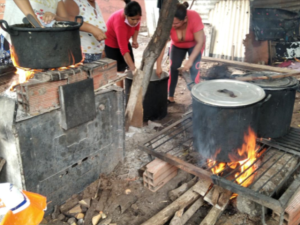 financial resources to obtain medical supplies and food for the people. Other aid came from the Peruvian government and other international agencies.
financial resources to obtain medical supplies and food for the people. Other aid came from the Peruvian government and other international agencies. These last couple of years the Mission Fund has been able to respond to many needs caused by anti-government protests in the country when people could not work as usual; then the very heavy rains and floods have taken away not only peoples place of work, but many have lost homes and possessions. The fund has been used to form comedores and ollas communes (dining areas and common pots) and was able to lessen hunger and disease in many pueblos. Migrants, older people, and children are a special concern for our communities and the Mission fund works constantly with our lay people and coordinators to identify their needs and respond.
These last couple of years the Mission Fund has been able to respond to many needs caused by anti-government protests in the country when people could not work as usual; then the very heavy rains and floods have taken away not only peoples place of work, but many have lost homes and possessions. The fund has been used to form comedores and ollas communes (dining areas and common pots) and was able to lessen hunger and disease in many pueblos. Migrants, older people, and children are a special concern for our communities and the Mission fund works constantly with our lay people and coordinators to identify their needs and respond. Let us remember, too, all new families— the struggling not just the celebrated— and all those mourning the absence of family members dear to them, including the widowed, refugees, prisoners, the homeless, runaways, trafficked persons, separated parents…
Let us remember, too, all new families— the struggling not just the celebrated— and all those mourning the absence of family members dear to them, including the widowed, refugees, prisoners, the homeless, runaways, trafficked persons, separated parents… Because the bee population is under threat, this day is a call to protect them and other pollinators which are critical to the heath of our ecosystem. May was chosen for World Bee Day because in the northern hemisphere the need for pollination is greatest at that time, while in the southern hemisphere it is a time for harvestinghoney and other bee products.
Because the bee population is under threat, this day is a call to protect them and other pollinators which are critical to the heath of our ecosystem. May was chosen for World Bee Day because in the northern hemisphere the need for pollination is greatest at that time, while in the southern hemisphere it is a time for harvestinghoney and other bee products. For our own mothers, living and deceased …
For our own mothers, living and deceased … Por nuestras propias madres, vivas y difuntas …
Por nuestras propias madres, vivas y difuntas …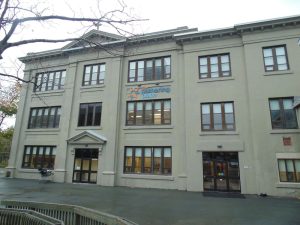
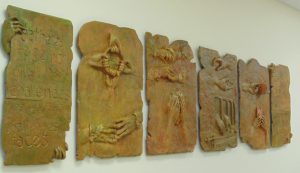
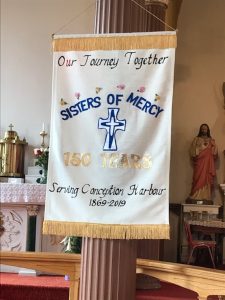 On Tuesday May 21 about thirty of us attended a grand celebration in the parish of Eucharist followed by a hot roast beef dinner. Sister Roisin Gannon represented the Presentation Sisters. Bishop Anthony Daniels surrounded by seven priests of the Grand Falls Diocese celebrated Eucharist in St. Anne’s Church with participation of the sisters and parishioners in readings, music and other moments in the liturgy. The church was sparkling and beautifully decorated with roses. A large banner hung in the church acknowledging the 150 years’ anniversary – Our Journey Together! At the end of Mass, a plaque was presented to the Congregation which will be placed in the church to commemorate the anniversary. In his homily Bishop Daniels connected the call and ministry of the sisters to that of the early disciples of Jesus and gratefully commended their life and ministry among the people of Conception Harbour and surrounding area.
On Tuesday May 21 about thirty of us attended a grand celebration in the parish of Eucharist followed by a hot roast beef dinner. Sister Roisin Gannon represented the Presentation Sisters. Bishop Anthony Daniels surrounded by seven priests of the Grand Falls Diocese celebrated Eucharist in St. Anne’s Church with participation of the sisters and parishioners in readings, music and other moments in the liturgy. The church was sparkling and beautifully decorated with roses. A large banner hung in the church acknowledging the 150 years’ anniversary – Our Journey Together! At the end of Mass, a plaque was presented to the Congregation which will be placed in the church to commemorate the anniversary. In his homily Bishop Daniels connected the call and ministry of the sisters to that of the early disciples of Jesus and gratefully commended their life and ministry among the people of Conception Harbour and surrounding area. In Canada Indigenous women and girls are targeted for violence more than any other group. More than 4000 Indigenous women and girls have gone missing or been murdered in the last 30 years – an appalling statistic! Canada’s National Inquiry into this tragic history called upon all governments – national, provincial, territorial and indigenous – to work together to build an effective and accountable National Action Plan to address this crisis. Indeed, there is an urgent need for all Canadians to make efforts to raise awareness of this Canada-wide tragedy and to do whatever we can to make Canada a country for all Canadians.
In Canada Indigenous women and girls are targeted for violence more than any other group. More than 4000 Indigenous women and girls have gone missing or been murdered in the last 30 years – an appalling statistic! Canada’s National Inquiry into this tragic history called upon all governments – national, provincial, territorial and indigenous – to work together to build an effective and accountable National Action Plan to address this crisis. Indeed, there is an urgent need for all Canadians to make efforts to raise awareness of this Canada-wide tragedy and to do whatever we can to make Canada a country for all Canadians.